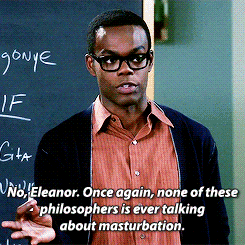I typically don’t review any of the academic nonfiction that I read here on the old blog, for a couple reasons:
- Sometimes I am reading it for writing research, and I feel weird talking on here about my creative writing. For whatever reason. Probably deep feelings of inadequacy. Let’s not dwell.
- Often it is very boring to people who are not me.
- I don’t want y’all to know how many books I read about the aftermaths of historical atrocities.
- A lot of academic nonfiction is inaccessible unless you have credentials with a university library; so a lot of folks wouldn’t be able to read the books anyway.
- Reviewing nonfiction is harrrrrrrrrd.
So take it as a sign of how grimly fascinating I found Kate Manne’s Down, Girl: The Logic of Misogyny. Not only am I writing a kind of blog post I almost never write for all the above reasons, but I also read (in like, three days!) an entire work of moral philosophy.

Joke’s on you, Chidi! Sometimes Kate Manne is kinda talking about masturbation!
Down, Girl takes on the daunting project of defining misogyny in ways that align with its actual effects in the world. Manne argues that it isn’t a question of individual men hating individual (or all) women, but rather a system for policing gendered behavior that steps out of line with a given set of patriarchal norms. Misogyny is the practice; sexism is the theory. Or as Manne puts it: “Sexism wears a lab coat; misogyny goes on witch hunts.”
Another striking — to me — argument that Manne makes is that a patriarchal society defines women by what they are able to give to men: Attention, sex, moral support, admiration, and so on. When a woman declines to give these things, misogyny is at work in the ways that she is corrected and punished. A woman who glowers at a catcaller is called a bitch; a woman who responds with hostility to sexual harassment in the workplace is a bad sport. And worse: Manne considers the case of the Isla Vista shooter, who resented not having a girlfriend so much that he went to a sorority, which he considered the metonymical representation of all the things (women) he was entitled to, but didn’t have.
She considers the habit of finding excuses for violent men while minimizing the lives, trauma, and existence of the victims of their violence. Manne calls this himpathy, which is perhaps a scootch too cutesy for me but otoh I expect moral philosophy could benefit by a little cutesiness so I’LL ALLOW IT.
The fact that the people who are liable to channel misogynist social forces have various anxieties and other psychological and social adjustment problems is hardly surprising. How is this supposed to mitigate the problem facing women though? When one’s effigy is one’s body, one burns right along with it.
Yo.
One of the things Manne explores is the virulent hostility that Hillary Clinton faced when she ran for president, which was a balm to my soul. Throughout that campaign cycle, I remember feeling unmoored from reality: Was Hillary Clinton really genuinely that much worse than all the guy Democrats everyone seemed to adore? It didn’t seem like it! But the same people who cherished Joe Biden insisted on Clinton’s dishonesty and corruption, and I could not make it make sense. Here’s Manne:
I believe that, in much of our thinking and acting, we channel and enact social forces far beyond our threshold of conscious awareness or even ability to recover—and sometimes, markedly contrary to our explicit moral beliefs and political commitments. There is hence a risk of convincing ourselves on the basis of post hoc reasoning not to look too hard at the residual patriarchal forces operating in our culture, as the patriarchal forces themselves gather in the backroom to laugh at our expense and grow stronger in our absence.
Perhaps Manne’s most important project in this book — at least the one that spoke most eloquently to me — is the effort to show readers the banality of misogyny, its ability to quietly saturate our own minds and those of people we love in ways both obvious and non-. Though she explores several high-profile cases of violent men widely condemned as monsters, she argues that they are exceptional in degree and not in kind.
Monsters are unintelligible, uncanny, and they are outwardly frightening. What is frightening about rapists is partly the lack of identifying marks and features, beyond the fact that they are by far most likely to be men. Rapists are human, all too human, and they are very much among us. The idea of rapists as monsters exonerates by caricature.
Down, Girl is — as you can maybe tell from the excerpts and certainly from the genre — a dense read that required focused attention from me. I can’t speak to its position in the world of philosophical theory, but I can say that it spoke very, very eloquently to me. Recommended.
PS okay okay okay okay okay Kate Manne actually doesn’t talk about masturbation, that I can recall. But she could have.